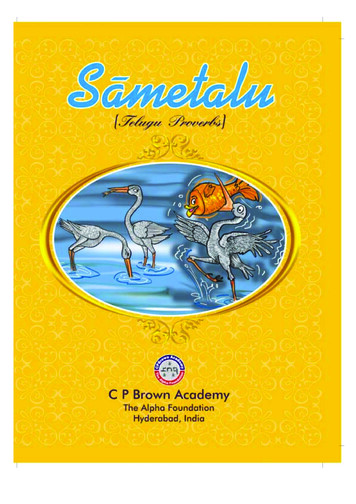
Transcription
-SAMETALU(With transliteration and English translation)TranslatorDr. VVB Rama RaoC P Brown AcademyThe Alpha FoundationHyderabad, India
-Sametalu (Proverbs in Telugu)Managing Editor: GRK MurtySenior Consultant: M Hanumantha RaoConsulting Editor: SS Prabhakar RaoAssociate Editor: G Ramesh BabuEditorial Support:Y Anand, C Rama Devi, D Sujatha DeviT Rajendra Prasad, V Aruna DeviChief Visualizer: A Bangaru BabuCover Design and Illustrations: B Anjaneyulu@ 2008 C P Brown Academy. All Rights Reserved.Every effort has been made to make this book the most accurate, veritable and helpful means of its kind.However, the publisher regrets any error that may yet have crept in. The information contained in thisbook is merely for reference and must not be taken as having authority of or binding in any way on theauthors, editor, publisher or sellers.Neither this book nor any part of it may be reproduced or transmitted in any form or by any means,electronic or mechanical, including photocopying, microfilming and recording or by any informationstorage or retrieval system, without prior permission in writing from the copyright holder.Trademark notice: Product or corporate names may be trademarks or registered trademarks, and areused only for identification and explanation without intent to infringe.Only the publishers can export this book from India. Infringement of this condition of sale will lead tocivil and criminal prosecution.First Edition: 2008Printed in IndiaPublished byC P Brown AcademyThe Alpha Foundation8, Dwarakapuri Colony, PunjaguttaHyderabad - 500 082, India.Website: www.alphacharities.org, www.cpbrownacademy.orgPrinted at:M/s. ICIT Software Centre Private Ltd.1, Technocrat Industrial EstateBalanagar Cross RoadsHyderabad-500 037, India.
PrefaceProverbs are perhaps as old as human civilization. As man started living in groups,new relationships came into vogue – both with people and places and the naturearound them. This ‘togetherness’ of living might have provided a rich platform forthe wise to observe the evolving group behaviour keenly and hypothesize on howand how not to conduct oneself for a better living.Every society and every language have proverbs. They are not the exalted wordswritten by literary savants. They are mere utterances of the common man. They arethe very ideas, views, and conceptions of evolving man. They are the manifestationsarising from everyday life. They are, perhaps, a reflection of the “commonconsciousness” of mankind expressed in ordinary language. But their greatness lies intheir pithiness. At the same time, they are statements of profound wisdom.They constitute oral literature of every society. Yet, owing to their enlivening andrefreshing nature, they survived for generations. Quite often, the underlying meaningof the proverbs in different languages appears similar. But their expression acquires anative tang, for they have evolved out of one’s own living experience amidst a particularsociety and its dynamics. They are mostly influenced by local experiences. They,thus, acquire an aura of ‘nativism’. And so, they sound dearer to its clan. They meanso much to the society from which they emerged. But it is this native thwack that attimes makes it difficult for outsiders to appreciate them.- - musileddu kuda- For instance, the underlying profundity of the saying–Mrugasira kartelo.rankestundi–canbe well appreciated only by those who know what Mrugasira kartestands for, the energy status of a musileddu – old ox, and what its ranke–bellowing–- succeeds Rohinidenotes. As Mrugasira karte. Karte that is known for its scorchingtemperatures and baking heat wave, it brings in its wake cool pre–monsoon windsand showers. These cool showers obviously rejuvenate even the old bull that sufferedthe worst during the preceding karte.And as the shower so softly touches the old ox,it also bellows in ecstasy. This whole truth has been decocted into that pithy statement.Thus, proverbs are to be understood, not in isolation, but only in conjunction withthe prosaic activities of mankind against the backdrop of changing nature and itsproducts.The Brown Academy of Alpha Foundation has taken up the task of transliteratingthe proverbs into Roman script and present them in a book form with a commentaryin English, for the benefit of those who cannot read Telugu script. We shall feel satisfiedif it serves its intended purpose. Feedback is solicited.GRK Murty
Transliteration Scheme of Telugu AlphabetVowels (JKÇ ó : Acculu)JPWDLTa–aiiuu ¶ZU.ru–.ru.lu.lueeSXFBJOJ—ooauam.Consonants (‚ ì Á : Hallulu)ah.–––ai––VV.H›YQ „ kkhgghKÇK Ç[ ¡ -cchjjh& @ ”¡È È}t.th.d.dh.n. Ç ŠÎ Î Î#tthddhn„ „ ƒ ’ pphbbhm†Ç ¡ ˆ yrll.vnn‰ ‹ ‚ ìH›Æs s.shksh r.
IntroductionAdages, aphorisms, maxims and proverbs are short pithy catchy utterances.Alexander Pope’s poetic witticisms, La Rochefocauld’s Maxims are different kinds ofsayings. But they are all stylistically crisp and eminently thought provoking.Proverbs are unique in that they open windows on the culture of a speechcommunity. Regional variations apart, they are understood and appreciated in thelarger language community. The sayings are witty, telling and appropriate to thecontext in conversation or an informal written discourse. These are products ofobservation and analysis with incisive insights into human nature. And then they areunique to the culture from which they come.Defining a proverb is as difficult as defining poetry. It is simply not possible toinclude all the different qualities of these expressive devices in a short definition. Wemust finally say that a proverb is what a proverb does. When in an expansive moodwe can say that proverbs are perceptions as varied as men (or, women for thatmatter) and nothing is unsuitable to form the basis of a proverb. These are productsof a language region and everything that is seen or heard could provide an occasionfor the making of a telling, apposite proverb. Broadly, we may describe proverb asthe quintessence of the collective experience and inherited value system and socialethos. Telugu language region abounds in villages, hamlets and ‘satellite villages’ inthe present day scenario. They represent a stance of the ‘sayer’ of the utterance.These utterances draw liberally from the environment—social, occupational, religiousand ethical—and carry on the age-old wisdom to countless future generations. A- which is both an idiom and a proverb too. Thequick example is this: taticettu. . . nida,shade of the tall palm tree is useful neither to itself nor to the wayfarer in the hotsun. This is sometimes useful while speaking of a singularly unhelpful person. The- - - cettu kinda palutagina.palm has given occasion to other utterances too. Tati. .Even if one drinks milk under the palm tree one is thought to be drinking only palmale, an intoxicant. And drinking intoxicants was not ‘respectable’ at all. And then- there is this: taticettuHow far can one push a. . ekkevadiki. entavaraku egadoyadam?.man trying to climb the palm tree?There are people who have a way of exaggerating things, or making habitualoverstatement (considered an Indian habit opposed to the British understatement).5
- - One comes up with the utterance golconda. miriyalu tati. kayalantesi. The personalluded to says that pepper seeds in Golconda. (name of a place, near Hyderabad,the seat of Qutub Sahikings) are as big as palm nuts.Many proverbs -bring in animals to provide humor and sometimes a sly sting.- Andaniki nenu;raganikima- appa This is supposed to be uttered by a camel: me forbeauty and for voice and song my elder sister: the donkey. The camel is not theacme of beauty nor the donkey the doyen of music.Unfortunately the use of proverbs in common conversation is a habit fastdisappearing in the present day urban people. It is heartening that among the ruralfolk the habit prevails.Certain very common names of vegetables are brought into proverbs. Here is anillustration: kandaku leni durada baccaliki. Why should the leafy vegetable baccali(spinach) feel the itchiness that the Elephant’s Foot (kanda) does not have. This isused when the targeted one keeps silent and someone else takes offence forsomething said or done. Vistaraku is a ‘leaf’ plate in which people have their meal.- morri samsaramThere are some proverbs making use of the word: Vistarakumorritirca lemu. It is impossible to fill the gaps in the leaf plate and the household. Whilestitching the leaves together, gaps persist in the leaf plate. There is always shortageof something in the common man’s household. There is another viramma pettuki.- ela?- Why a leaf plate for what Virammavistaraku(a woman not very generous) gives(in charity, perhaps). There are some proverbs where the word kunda. (clay pot) isused. An ordinary clay-baked pot is used as a symbol of the human body. It is usedoccasionally in spiritual discourses.Familiarity with the language to the extent of the three R’s would not be enoughto appreciate the use of a proverb or use it in an appropriate context. It needs adeep understanding of the culture. Some proverbs have similar ones in other- – from smoke intolanguages. For example, the idiom/proverb pogalonincisega loki(the heat of) fire is similar to the expression in English - ‘from the frying pan into thefire.’Proverbs are products native to a given language. Some are spicy and enrich thepersuasiveness or effectiveness of the speaker. Some have universal appeal as in:- biddala?- geddaloccaka- While in the lap they are kids, but whenaddalalobiddalukani.6
they are growing beards, are they so? The implication is that they are not to beexpected to be as obedient or loving as when they were kids. Mappavaccu kani- suggests that it is easy to familiarize one with something, or teach, or dotippalemusomething but it is not easy to turn one away from that. If you make a beggaraccustomed to be given alms, it would be quite a job to turn him out without givingalms. If a child is given to pampering, it would be an uphill task to wean him out ofthat. There is another, which has a similar import: you can plant something, but- When it is- - vepakomma,plucking it away may not be that easy. Vestetiste- ammavaru.planted it is a neem plant. But you cannot pluck it away at will; it turns into a goddess.The neem tree is believed to be goddess by the rural folk.The following are some broad heads into which proverbs could possibly begrouped:i.those dealing with human natureii.those with social aspect of living and life stylesiii.those relating to matters ethicaliv.those dealing with inter–family relationsv.those revealing insights into public lifeFor Telugus themselves there is no guarantee that all the proverbs in the languageare understood automatically. With changing times, changing lifestyles, communityliving and family setups, the younger generations and those mostly living in places faraway from Andhra Pradesh and the diaspora may find themselves confused andclueless when confronted with them.The proverb bataka leka badi. pantulu may seem odd. Literally, unable to live(making a living,) one becomes a schoolteacher. Badi usually is an elementary orprimary school where in those days of distant past teaching did not require any priortraining for a teacher and the compensation was too meager for the teacher tomake a decent living. It is not really so now. This we can call a ‘period piece’ amongproverbs, which demands setting up a category for itself.Some proverbs gently pull the leg of people who have kinks in character. For a- man who is showy and pretentious with no wherewithal this is used: ambali tage7
-- - vadiki. For the one slurping gruel, another to lift his moustache. misalette vadokadu.(to facilitate the intake).For the literary translator rendering these into an outside culture poses trickyand intriguing challenges, which call for his ingenuity to meet them successfully. Longexplanatory notes would be needed. But for a reader they are a drag whetherembedded in the text or included as glossary. (For example, the idiomatic expressionkukka muriki in Telugu signifies plentiful availability or ubiquitous presence, equivalentto ‘dime a dozen’ in American English. The two words in the idiom mean literallykukka – dog and muriki - dirt). Interestingly, in English they say dirt-cheap. Perhaps inboth languages dirt is something that is found everywhere.In Telugu, proverbs are used extensively in conversation. Usually as one growsolder, the tendency to bring in proverbs becomes more and more marked. Theyare used as brilliant stylistic flourishes to drive home a point or even to start a discourse.Thinking of apposite proverbs and the contexts in which to use them come withexperience. To listen to good proverbs with very accurate and expert use, one mustlisten to actual conversations among the old people, people with a good deal ofexperience in life and knowledge of men and matters. They enrich the commandover language. Here are a few Telugu proverbs in Roman script followed by meaningsof a few difficult words, their English rendering and a brief comment.It is hoped that the present offering will help the enthusiastic Telugu people aswell as people of other linguistic communities in India and abroad to have a taste ofthe rich wisdom contained in these storehouses and profit from them in moldingtheir own lives and progress towards happier and more meaningful existence.I express my gratitude to the authorities of C P Brown Academy for sponsoringthis effort and providing me an opportunity of pleasant association with the project.b8
-1. Akali ruci yerugadu, nidra sukham yerugadu.-Akali hunger; ruci taste; nidra sleepHunger does not know (need) taste and sleep knows (needs) no comfort.Comment: When a person is very hungry anything tastes good; when very sleepy, onedoes not require the usual comfort one looks for.---- - 2. Aru nelalu savasamcestevaruviru avutaru.Literally, six months' company makes one the other.Comment: Being together makes one absorb the ideas of the other to the extent thatthere appears total transformation in both. This is usually when the change is not for thebetter.--3. Antya nisturamkantemelu. adi nisturam.Nisturam blame.Better to get the blame (for an action or for help asked) earlier (at the beginning) than later.Comment: Before taking up any activity, it is better to get to know the objections orcriticism of others, so that one need not regret one's effort at the end.9
-4. Annapu corave- ganiaksharapu corava ledu.Corava aggressivenessAggressiveness only in eating, not in education.Comment: A person may be more interested in food than in learning. One should strikea reasonable balance between acquisition of knowledge and physical needs.-5. Alasyam amrutam visam.-Alasyam delay; Amrutam nectar; Visam poison.Delay turns nectar into poison.Comment: Opportunity unavailed becomes harmful. One should not delay.--6. Alu ledu,culu ledu,kodukuperusomalingam.--Alu wife; Peru name-No wife and no pregnancy, but the child’s name is Somalingam.Comment: Some people look for results even before the necessary tasks are performed.This indicates absurdity in wildly expecting something to happen.--7. Are- dipanikivelugu yekkuva.- - -Are dipam lamp about to go out; Velugu brightnessThe lamp about to go out gives sudden brilliance.Comment: This suggests subtly the final glow or false promise before the approaching- telivi: that before death one gets brilliant idea(s)end. There is a saying cavu-8. Aggi mida guggilam.Guggilam incenseAdding incense to the fire.Comment : When a person is already angry the anger is aggravated by indiscreet words.On those occasions, it is wise to be silent; otherwise it would add insult to injury.10
-- lavu9. Asapika sannam--Asa desire; Lavu greatDesire is great but the throat is thin (narrow).Comment: Usually a greedy person wishes to acquire all, but has limited ability to absorb.One should realize what one deserves before desiring it. This proverb is akin to theEnglish expression 'bite off more than you can chew'.-10. Adagandeammaina- pettadu.- unaskedAdagande .Without being asked even a mother will not give.Comment: Without asking, help wouldn’t be forthcoming, even from well-wishers.- - 11. Adigevadikiceppevadu. lokuva.Lokuva inferior(in) statusFor the one who asks, the one who answers seems inferior in status.Comment: It is easier to put questions than to answer them. It is therefore necessary tobe considerate to others and raise only genuine doubts for proper clarification.11
- 12. Aiswaryamvaste- ardha ratrigodugupattamanevadu.Aiswaryam prosperity,wealth; Ardharatri midnight,pattu . Godugu. . hold the umbrella.The neorich person demands an umbrella to be held for him even at night.Comment: A person, who acquires riches suddenly, makes unreasonable demands, ashis riches go to his head and make him arrogant. One should be poised and maintainemotional balance, when fortune smiles on him.- - 13. Andite- siga andaka potekallu.Siga a lock of hair on top of the head.To go for the head or fall at the feet of a person to get one’s purpose served.Comment: This is said of the opportunist who changes tactics, with the sole purpose ofrealising his wishes.--- 14. Angatlo. notlo. anni unna, alludi. sani Angadi inauspicious (graha) planet; misfortune. small shop; Sani Though there is everything in the shop, there is ill luck in the son-in-law’s mouth.--15. Anta mana mancike- everythingAnta Everything is only for our good.Comment: Normally used in comforting someone, the statement indicates thatacceptance of what befalls one is a positive attitude. Worrying about what is unavoidableserves no purpose. One should realize what will be, will be.----16. Arogyame mahabhagyamu-- Arogyamu health;Mahabhagyamu great wealthHealth is real wealth.Comment: In one’s life, health is more essential than material wealth and so it should notbe neglected.12
-- 17. Adi lonehamsa padu.Hamsapadu is a mark of insertion while making a correction in writing.An insertion at the very beginning of writing.Comment: Usually said when there is a hurdle, gap or break in the very beginning.-18. Appu cesipappu kudu.Appu debt; Pappu kudu . expensive food; in villages eating dal is considered the mark ofwealthEating well (enjoying comforts) on borrowed money.Comment: Borrowing used to be viewed as undesirable in the past. People, now underthe influence of consumerism, want to live on their future income. It is still wisdom to beneither a borrower nor a lender, in the words of Shakespeare.-19. Appu tirci angatanundu.-Appu tirci clearing debtOnly after clearing dues, visit the shop.Comment: This is a word of advice, which impresses on us the need for clearing olddebts before trying to spend again.13
20. Bratikunte. balusaku tinavaccu.Balusaku awild, leafy vegetableIf alive, one can subsist even on leaves.Comment: To achieve anything in life, to be alive is important. One should thereforemake all efforts to survive and endeavor to reach the goals set for oneself.21. Bhakti lenipujapatri cetu.- Patri leaves used for worshipping God, especially Ganesa.Worship without devotion is a waste of leaves,Comment: For a true worship of gods, it is not the external paraphernalia that is asimportant as devotion.----22. Budidaloposina panniru.--Budida ash; Panniru scented water, like rose water.Perfume thrown into ash.Comment: A fruitless effort is one that does not achieve what one sets out for.- 23. Bodi. talaku mokaliki mudi- Boditala Hairless head; Mokalu knee.Making a knot between the shaven head and the knee.Comment: This refers to the way of trying to bring together two disparate things for aharmonious blend. When such an attempt is made, the listener understands the absurdity.--24. Capa kinda nirula-Capa mat used for sitting on, in rural and semi-urban areasLike water under a mat.Comment: This refers to something done secretly. Though on the surface it appearsfine, it can be quite dangerous in the consequence.14
25. Caccinavanikallu. caredesi.Caredu large.The eyes of one dead, are large (attractive).Comment: The good deeds of the dead are normally praised beyond what they deserve.It is possible that in such remembrances of things past there is likely to be considerableexaggeration – even, falsehood.-26. Cetulu kalinakaakulupattukunnatlu.-Kalinaka after getting burnt; Pattukonu hold.Holding leaves after the fingers are burnt, by holding a hot cooking pot or object.Comment: The proverb refers to action taken after something harmful has already happened.It is always desirable to take proper precautions to avoid any undesirable developmentsrather than regretting after the event. Prevention, they say, is better than cure. 27. Ceviti. vadiudinatlu. cevilo sankham Cevitideaf person; Sankham conch. vadu .Like blowing a conch in the ears of the deaf.Comment: It refers to making a complaint to someone, who does not even pay attentionto the complaint – much less, act on it; it does not serve any purpose.--28. Ciniki ciniki galivana ayinatlu.Ciniki drizzle (in drops)Like drizzles becoming a cyclone.Comment: Sometimes, a mere altercation, starting off in a small way, may lead to a fiercequarrel and continuing enmity.--29. Cerapakura cedevu.Cerupu spoilDon’t spoil any other person; you would end up in ruin yourself.Comment: It is unwise to spoil the other person, mostly out of ill will, as it will usuallyresult in one’s own destruction.15
-30. Dongaku telu kuttinatlu.-Telu scorpionLike a thief, stung by a scorpion.Comment: This refers to some criminal who cannot even complain. If a person is doingsomething criminal, he cannot complain against a natural problem/discomfort he has toface. The moral is that it is better not to commit blunders one may find it difficult to getout of them.--31. Devudu. varam iccina pujari varam ivvadu.-Pujari priest in a templeThough god gives a boon, the priest doesn’t.Comment: In our dealings with subordinate officers in a setup, we come across hurdlesin getting our rightful things done. Even if the higher-up agrees to our request, the juniorofficer will prove to be a stumbling block and deny justice to us.32. Daridrudivadagalla. . vana. pellikiDaridrudu pauper, unfortunate person; Vadagalla. . vana hailstormFor the wedding of an impecunious (a poor) man, a hailstorm.Comment: This refers to the bad luck of an unfortunate person. When one is in misery,additional troubles come upon one and make one’s life more miserable.16
--- -33. Dipamunnapude. illu cakka bettukovaliCakka bettukonu keep in order.When there is light, one should set things right in one’s house.Comment: While there is opportunity one must avail oneself of it and make properarrangements for oneself and the family. It is similar to “make hay while the sun shines.”- 34. Deyyaluvedaluvallincinatlu.Deyyalu evil spirits;Vallincu recite, quote- Devils reciting (quoting) the Vedas.Comment: Similar to ‘the devil citing the scripture’, which suggests that an evildoer maytry to justify his evil actions, by cleverly citing the sacred books. It is defending theindefensible.- 35. Dabbukulokamdasoham.-Dasoham becoming a slave, literally ‘I am a slave’.The world is a slave to money.Comment: In the commercial world of ours, all become slaves/worshippers of money.The proverb cautions against the excessive power of money over human psychologyand tries to advise people to consider other values in life as well.36. Durapukondalununupu.Nunupu smoothDistant hills appear smooth.Comment: People or things appear fascinating from a distance, as distance lends themcharm. One should not be lured by false charms but should judge people after observingthem closely. dukhamunaku cercu37. DurasaDurasa make one reach (take). greed; Cercu Greed lands one in grief.Comment: If one is excessively greedy, one is most likely to get into trouble. The goldenrule is deserve and desire – and moderately.17
-38. E endakua godugu.Enda Sun’s heat.An umbrella to suit the sun’s heat.Comment: This suggests that adjustment to the situation, and adaptability to the presentrequirements is essential for success in life. Rigidity is not recommended in all matters.But when practiced in the extreme, it would turn one into an opportunist, who gives upall ethics for immediate success.--39. Ekkadainabava kanivanga tota. daggara matram kadu.Bava brother-in-law ; Vanga tota brinjal garden.Maybe, brother-in-law anywhere, but not at the brinjal (egg plant) garden.Comment: When it comes to money or material, relationship is of no consequence.Some are extremely business-like in their relationships.--- 40. Evaru tisukunna gotilo- varepadataru.- - in the pit (ditch)Gotilo The one who digs a ditch to harm someone falls into it oneself.Comment: If one plans to harm others, he will be harmed himself. It is therefore advisableto wish the welfare of all.41. Gajulaberamubhojananikisari.Gajulu bangles: bangle-sellers are (or used to be) common in villages.The sale proceeds of bangles are just enough to buy food.Comment: For a petty businessman, the profit from his business would hardly meet hisbasic needs. This refers to an unprofitable enterprise.-42. Gorantadipam kondantavelugu.Goranta of the size of a nail (small); Kondanta size of a hill (large).The lamp (wick) is of the size of a nail; illumination the size of a hill.Comment: Even a small lamp can give a wide glow. Physical size does not always lead toinsignificant actions. It is the largeness of purpose that makes the act big.18
--43. Kuti. kosam koti. vidyalu.Kudu literally, food, livelihood; Koti crore (ten million).Ten million skills are all for earning one’s livelihood.Comment: The purpose, by and large, of acquisition of diverse special skills is only tomake a living.--44. Gorucuttu. . mida rokali potu.Gorucuttu whitlow; Rokali pestle used for pounding, especially in villages nowadays.The blow of a wooden pestle on a whitlow-infected nail.Comment: Refers to a severe blow of misfortune on some one already suffering. Whenmisfortunes come, they come in battalions. It is on those occasions, one should be boldand face the situation.45. Guddilomella.Guddi . . blind; Mella squintSquint is better than blindnessComment: A slightly better position. All pleasures and miseries are relative. Whencompared with a man with two of his legs amputated, the one with at least one leg isfortunate. It is the positive (optimistic) attitude that matters.19
--46. Eddu pundu. kakiki muddu /mudda?Eddu ox; Pundu . ulcerAn ox’s ulcer is dear to a crow.Comment: When a person is suffering, the other person is pleased. It shows the extremeinhumanness of certain people. Even if one cannothelp others in their difficulties, at least- it signifiesthey should not derive pleasure out of them. (If in the interrogative mudda,that one doesn’t care for another’s pain. Even that attitude is undesirable.)47. Guddu. . vacci pillanu vekkirincinatlu.Vekkirincu mockLike an egg heckling the young bird.Comment: A young, inexperienced man ridiculing an elder one. It is better to learn torespect the elderly and experienced people, and, if possible, learn from their expertisegained over many years.-- 48. Gudini,gudilolingannimingevadu. Lingam idol of SivaA cheat, literally one who swallows the temple as well as the deity inside.Comment: When greed grows excessively, a person wishes to acquire all – withoutcaring for the means to attain his immoral goal.- -49. Gurramu grudditakkuva ledu.-. . daina, danalo- - fodder for horsesDana .Though blind, the horse does not eat less.Comment: Refers to a person, who may not be earning anything, but his needs will be noless than any body else’s. One should learn to live within one’s means, even by limitinghis basic needs.- 50. Illu alakaganepanduga?.Aluku to smear the floor with dung.With a mere dung wash of the floor the festival is not complete.Comment : On festival eve, the earthen floors are given a dung wash. But there must beseveral other tasks to be performed for the festival. The practice is still extant in villages.The use of dung is part of rural economy as well as a hygienic practice, fast fading out.20
-51. Minga metuku ledumisalakisampenga nune-Metuku tiny piece of food; Misamu moustache: Sampenga champakLiterally, no food to eat but for the moustache perfumed oil.Comment: This is said when one does not live within one’s means. Extravagance is to beavoided at any cost, as it would turn one into a pauper sooner than later.-52. Katte. . vanka poyyi tirustundiKatte . firewood;Poyyi a country oven, usually made of bricksThe fire straightens the curvature in the faggot.Comment: Force or strategy removes angularities. For each undesirable quality of anindividual, there will be a cure to make it agreeable to the needs of society.--53. Kilerigi vataKilu joint in the human body (leg or hand) ; Vata branding with hot ironOne should know the joint and brand it.Comment: In the past and also occasionally at present, there is a practice of scorchingor branding literally as a therapy. One should identify the problem and take appropriatesteps to solve it. In other words, you have to know the sensitive spot and work on it foryour success.21
-54. Konte. korivi ammite adivi.Korivi torchTo buy is like a torch: to sell a wilderness.Comment: This has reference to the price one gets and one has to pay while buying andselling. Neither buying nor selling is profitable to the needy.-55. Intikannagudi. bhadramu.Bhadramu safeA temple is safer than the house.Comment: Sometimes, one’s place of work or stay elsewhere is better than living inone’s own house, especially when domestic harmony is absent.----- --56. Jogi jogi rasukunte. raledi budide.Jogi an ascetic who has renounced allIf two ascetics jostle each other only ash falls. (for they are known to cover their bodieswith vibhuti.)Comment: When two poo
ethos. Telugu language region abounds in villages, hamlets and 'satellite villages' in the present day scenario. They represent a stance of the 'sayer' of the utterance. These utterances draw liberally from the environment—social, occupational, religious and ethical—and carry on the age-old wisdom to countless future generations. A
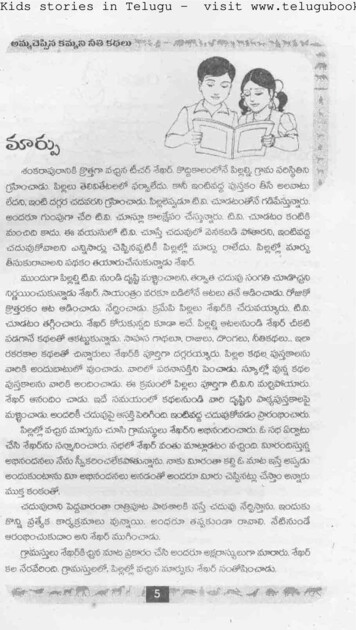
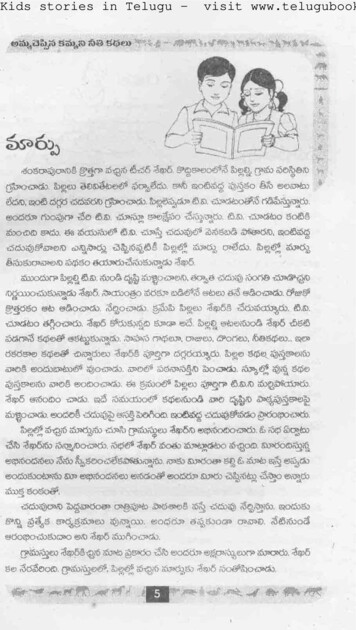
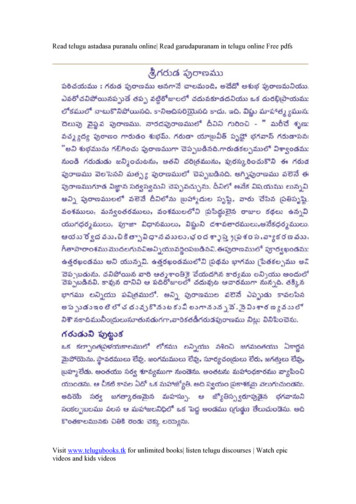
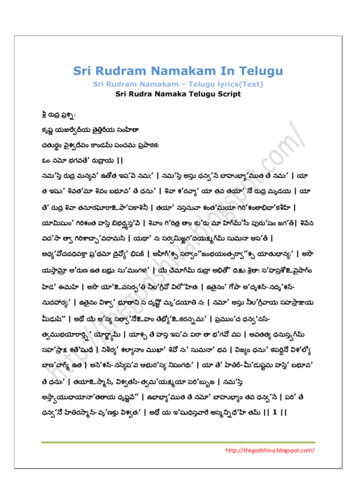
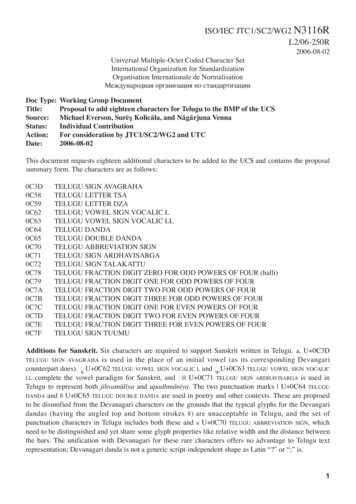
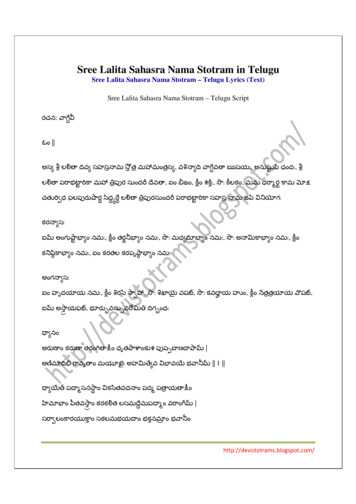

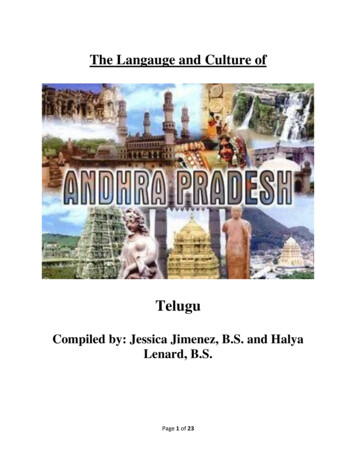


![Ipe: March-2016 [Ts] English) Books - Telugu Academy Maths (Telugu Maths](/img/62/14208-books-doubtnut-question-bank-v3.jpg)